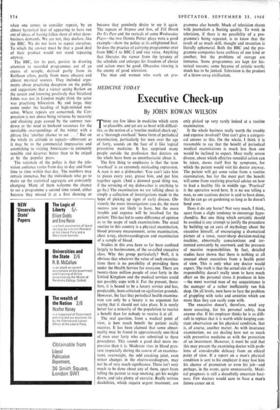Executive Check-up
MEDICINE TODAY
By JOHN ROWAN WILSON
THERE are few ideas in medicine which seem so plausible, and yet are so beset with difficul- ties, as the notion of a 'routine medical check-up,' or a 'thorough overhaul.' Some form of periodical examination, particularly for men over the age of forty, sounds on the face of it like logical preventive medicine. It has surprised many people outside the profession that doctors on the whole have been so unenthusiastic about it.
The first thing to emphasise is that the term `overhaul' is an extremely misleading expression. A man is not a dishwasher. You can't take him to pieces every year, grease him, and put him together again. (And a damned good thing too, if the servicing of my dishwasher is anything to go by.) The examination we are talking about is simply a collection of investigations made in the hope of picking up signs of early disease. Ob- viously the more investigations you do, the more success you are likely to have, but the more trouble and expense will be involved for the patient. This has led to some difference of opinion as to the scope of such examinations. The usual routine in this country is a physical examination, blood pressure measurement, urine examination, chest x-ray, electro-cardiogram and examination of a sample of blood.
Studies in this area have so far been confined largely to businessmen, of the so-called executive class. Why this group particularly? Well, it is obvious that whatever the value of such examina- tions there is no possibility of providing them under the Health Service for everyone. There are twenty-three million people of over forty in the United Kingdom and the medical services could not possibly cope with it. For the present, there- fore, it is bound to be a luxury service and has, predictably, been criticised on egalitarian grounds. However, the fact that periodical health examina- tion can only be a luxury is no argument for saying that it should not take place. It is surely better for a minority of the population to receive a benefit than for nobody to receive it at all.
The real question, from a medical point of view, is how much benefit the patient really receives. It has been claimed that some abnor- mality may be found in approximately one-third of men over forty who are submitted to these procedures. This sounds a good deal more im- pressive than it is. Moderate rises in blood pres- sure (especially during the course of an examina- tion), overweight, the odd creaking joint, even minor changes in the electro-cardiogram, may not be of very much significance. There isn't very much to be done about any of them, apart from telling the patient to stop smoking, get his weight down, and take plenty of exercise. Really serious disabilities, which require urgent treatment, are only picked up very rarely indeed at a routine examination.
Is the whole business really worth the trouble and expense involved? One can't give a categori- cal answer to this. On the whole, I think it is reasonable to say that the benefit of periodical medical examinations is much less than one would be inclined to expect. Most really severe disease, about which effective remedial action can be taken, shows itself first by symptoms, for which the patient would visit his doctor anyway. The patient will get some value from a routine examination, but for the most part the benefit will come from receiving practical advice on how to lead a healthy life in middle age. 'Practical' is the operative word here. It is no use telling a man, as one cautious doctor is said to have done, that he can go on gardening so long as he doesn't bend over.
Does it do any harm? Not very much, I think, apart from a slight tendency to encourage hypo- chondria. But one thing which certainly should be avoided is any attempt to justify the procedure by building up an aura of mythology about the executive himself, of encouraging a dramatised picture of a tense, razor-sharp decision-making machine, abnormally conscientious and tor- mented constantly by overwork and the pressure of massive responsibilities. In fact, detailed studies have shown that there is nothing at all unusual about executives from a health point of view. This is only what any doctor would expect. The truth is that the actual size of a man's responsibility doesn't really seem to have much effect on the personal stress it produces in him —the most worried man of my acquaintance is the manager of a rather inefficiently run fish shop. On all levels, men have to face the problem of grappling with tasks and anxieties which are more than they can easily cope with.
The executive doesn't, therefore, need any more cosseting, for his personal safety, than anyone else. If his employer thinks he is so diffi- cult to replace that it is worth while keeping con- stant observation on his physical condition, that is, of course, another matter. As with insurance examination, we are dealing here not so much with preventive medicine as with the protection of an investment. However, it must be said that this may present the examining doctor with prob- lems of considerable delicacy from an ethical point of view. If a report on a man's physical condition is sent to his employer it may lose him his chance of promotion or even his job—and perhaps, in the event, quite unnecessarily. Medi- cal prognosis is still a dreadfully uncertain busi- ness. Few doctors would care to base a man's future career on it.


































 Previous page
Previous page